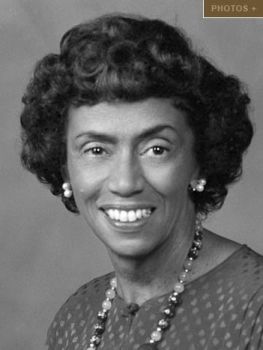Courtesy of Talladega College
Dr. Cobb was a distinguished professor and university administrator who conducted trailblazing cancer research, including studies that advanced the understanding of how skin cells that produce melanin become cancerous. But she was also deeply concerned about equity in American life. She called health care delivery “one of the tragedies in America.” In a 1989 book, I Dream a World: Portraits of Black Women Who Changed America, she stated, “We have what I would call educational genocide…when I see more black students in the laboratories than on the football field, I’ll be happy.”
Dr. Cobb was born in 1924. Her father had been the first African American to graduate with an M.D. from Cornell. She attended University of Michigan for three semesters beginning in 1942. Finding the environment hostile to Black students, she transferred to Talladega College. At Talladega she was mentored by Bacteriology Professor James R. Hayden. She earned her B.S. in biology from Talladega, then went on to earn an M.S. and Ph.D. in cell physiology from New York University.
Early in her career, she taught and conducted research at New York University, Hunter College, and Sarah Lawrence College. Later, while serving as dean and professor of zoology at Connecticut College, she established a scholarship for Black students and a post-baccalaureate program to prepare underrepresented students for degree programs in medicine or dentistry. She went on to serve as dean at Douglass College, the women’s division within Rutgers University, where she developed innovative programs to improve the access of women and minorities to science and mathematics fields.
In the early 1960s, Dr. Cobb and longtime collaborator Dr. Jane Wright, demonstrated the effectiveness of methotrexate in treating skin and lung cancer and childhood leukemia. The drug is now used in treatment of many types of cancer.
In 1981, Dr. Cobb was named president of California State University at Fullerton (CSUF), where she established faculty teams to tutor students in mathematics. She also secured funding to construct a new science lab, a computer science building, and a gerontology center. During her tenure at CSUF, she also secured funding for the university’s first on-campus student residence hall and established the institution’s first endowed professorship.
She was elected to the National Institute of Medicine in 1974, was the first Black woman appointed to the National Science Board, and the inaugural recipient of the Reginald Wilson Award for significant accomplishments in the area of diversity in higher education. Dr. Cobb once said, “I’d like to be remembered as a Black woman scientist who cared very much about what happens to young folks, particularly women, going into science.”



